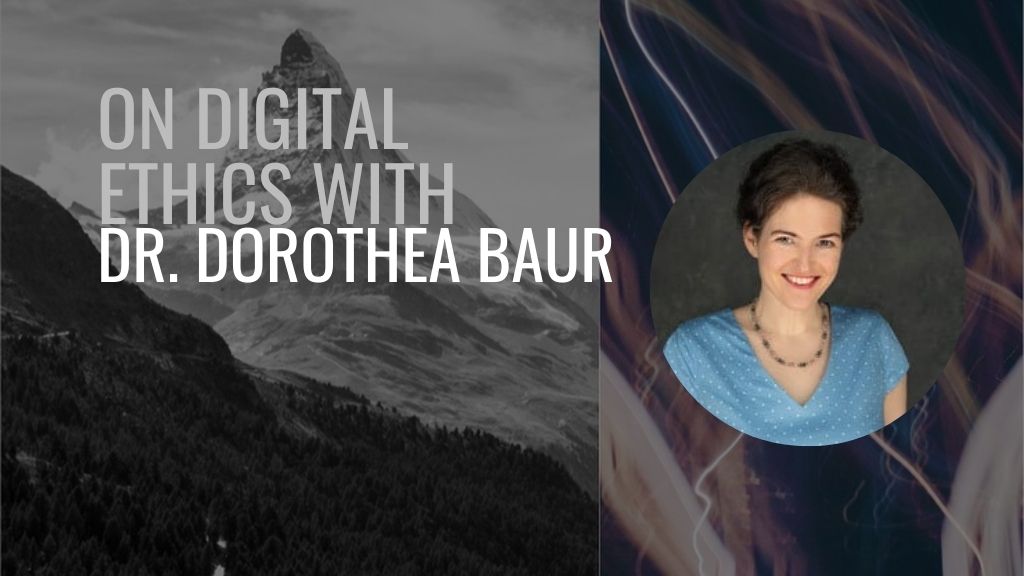On Digital Ethics: Dr. Dorothea Baur
Sophie Känzig • December 2021

Reputable companies have been getting a lot of media coverage due to security breaches and data leaks lately. As a result, digital ethics is a topic that has made its way on the agenda of business leaders worldwide. But what is digital ethics exactly and why is it relevant for our time? In our new interview series we speak to thought leaders around the world to find answers. In our first interview we spoke to Dr. Dorothea Baur, founder and owner of Baur Consulting and an expert with many years of international and interdisciplinary experience in the field of ethics, responsibility, and sustainability.
Digital Ethics is a field of study that closely looks at practices in the digital world. It raises critical questions to start a dialogue about how data is stored, used or shared and looks closely at how this can impact the trajectory of individuals, society or businesses.
It’s time to think about the long term effects of not considering these questions. Educating yourself on the topic is the first step to taking back control of your data and how it’s used.
In light of recent data breaches, we’ve been hearing more and more about the importance of guarding our personal information. What would you say to someone who says, “I have nothing to hide”?
It’s not about hiding information per se, it’s about deciding who can make decisions for you based on the information available about you.
Know that not everyone uses your information in your best interest. Let’s take the topic of mental health for example: You might be willing to speak openly about your mental health struggles, you might be an advocate of some sorts, even. But what if a bank denied you a loan because of that? What if all of your job applications were weeded out by an algorithm because of your mental health activism on social media?
What can I do if I see data being misused?
Raise the concern. If you’re an employee in a large organisation, find the right department to address it internally. Banks and insurance companies usually offer ways for employees to place their concerns anonymously. I would always try to address whatever is going on internally first. Often, issues can be resolved quickly and are rooted in ignorance, not in pure evil.
If your concern is not taken seriously and you keep getting dismissed, get external help. Seek legal advice first to see what your rights and risks are in this situation. Then do some research in your industry: Can you find a non-profit organisation that offers advice and support? Who else would be able to support you? Only as a last resort would I turn to public media outlets or to social media.
And what can individuals do when they are faced with organisations that misuse their data?
In an ideal world goods and services available to us should be safe, transparent and easy to understand by default. Supermarkets for example are highly regulated. Everything you buy there is safe for you to consume within moderation.
That’s not the case today in the tech industry. Some products are harmful to their users and the makers are fully aware of this. Default settings are rarely in the best interest of the people. Of course users can change the default settings, but how often do you really read cookie banners and change your settings accordingly? Convenience wins almost all of the time.
Consumers shouldn’t be asked to do so much research before using a product. Don’t get me wrong, education is great. But if the choice is either in-depth research or exploitation, we have a problem. If we keep this up, privacy will become a privilege of the wealthy.
On your website baurconsulting.ch you state that at the intersection of technology, society and the environment, companies are often confronted with ethical questions. What are some examples of those questions and how do you help foster the conversation around them?
When entering hard conversations around digital ethics, I am sometimes met with skepticism. I want people to know I’m not here to shame anyone or point fingers. I’m also not here to tell anyone what to do. My job is to help teams figure out who they believe they are collectively. Only when all team members share the values that are fundamental to their organization can we build a credible and effective strategy upon it.
People approach me with all kinds of questions, mostly industry-related ones. They are usually along the lines of, “How much can or should we push our clients into sharing more data, buying more products or acting more health or environmentally conscious?”.
What is your answer to those questions?
There is no one right answer and it’s not my call to answer those questions, either. Finding that common understanding of who you are as a company, what you collectively believe in, is everything. Without that you can’t have a fruitful conversation around the questions raised.
What I like to add is that everything is a choice and has ethical implications. Even not making a choice is a choice. Conforming to the status quo is just as political as doing the opposite.
It all comes down to what matters most to you as an organisation. Is it your financial bottom line, the environmental implications or social costs? Only when you are clear on what is important to you, can you act accordingly and also, if I may add, reap the ‘benefits of ethics’.
More information about Dr. Dorothea Baur and Baur Consulting can be found here.
You can also follow her on